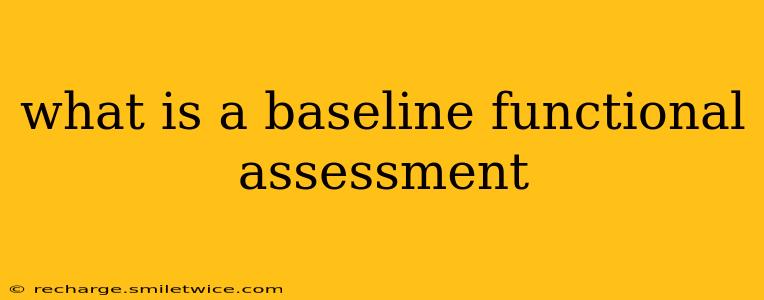What is a Baseline Functional Assessment?
A baseline functional assessment is a comprehensive evaluation of a person's abilities and limitations in performing daily activities. It serves as a starting point to understand their current functional status, identify areas needing support, and track progress over time. This assessment is crucial for creating personalized care plans and measuring the effectiveness of interventions. Think of it as a snapshot of an individual's functional capabilities at a specific point in time.
Unlike a simple medical examination focused on disease, a baseline functional assessment delves into the individual's ability to perform tasks essential for independent living. These tasks encompass a broad spectrum, ranging from basic self-care activities to more complex instrumental activities of daily living (IADLs).
What are the Purposes of a Baseline Functional Assessment?
Several key purposes drive the need for a baseline functional assessment:
- Care Planning: It forms the foundation for developing an individualized care plan tailored to the person's unique needs and strengths.
- Goal Setting: By identifying strengths and weaknesses, realistic and measurable goals can be established.
- Intervention Planning: The assessment highlights areas where intervention might be beneficial, such as physical therapy, occupational therapy, or assistive devices.
- Progress Monitoring: Regular reassessments, compared to the baseline, allow for tracking progress and making necessary adjustments to the care plan.
- Resource Allocation: It helps determine the level of support and resources required, including home healthcare, assisted living, or nursing home care.
- Legal and Insurance Purposes: In some cases, a functional assessment is needed to support applications for disability benefits or other forms of assistance.
What Aspects are Typically Included in a Baseline Functional Assessment?
A typical baseline functional assessment includes evaluations across several domains:
- Physical Function: This assesses mobility, strength, balance, range of motion, and endurance. It might involve tests like gait speed, timed up-and-go, and grip strength.
- Cognitive Function: This evaluates memory, attention, problem-solving, and decision-making abilities. Tests may include mini-mental state examination (MMSE) or other cognitive screening tools.
- Activities of Daily Living (ADLs): These are basic self-care tasks, including bathing, dressing, toileting, eating, and transferring (moving from bed to chair, etc.). Assessment often involves observation and interviews.
- Instrumental Activities of Daily Living (IADLs): These are more complex tasks necessary for independent living, such as managing finances, preparing meals, using transportation, shopping, and managing medications. Assessment might involve questionnaires or observation of actual task performance.
- Social Function: This explores the individual's social interactions, support networks, and participation in social activities.
- Mental Health: This considers the presence of any mental health conditions that might affect functional abilities.
- Environmental Factors: The assessment also considers the individual's living environment and its impact on their functional abilities.
Who Conducts a Baseline Functional Assessment?
Several healthcare professionals may conduct a baseline functional assessment, depending on the individual's needs and the setting. These include:
- Occupational Therapists: Focus on ADLs and IADLs, and adapting the environment to support function.
- Physical Therapists: Concentrate on physical abilities and mobility.
- Social Workers: Assess social support and resources.
- Nurses: Contribute to overall assessment and care planning.
- Physicians: Provide a medical overview and may order additional assessments.
How Often is a Baseline Functional Assessment Repeated?
The frequency of reassessment varies depending on the individual's condition and needs. Some may require frequent reassessments (e.g., weekly or monthly), while others may only need them periodically (e.g., every 3-6 months or annually). The purpose is to track progress, adjust interventions as needed, and ensure the individual's care plan remains effective and relevant.
This detailed overview provides a comprehensive understanding of baseline functional assessments and their critical role in person-centered care. Remember, the specifics of the assessment can vary based on individual needs and the setting.
